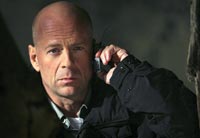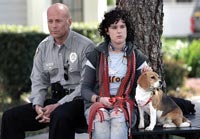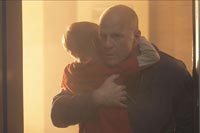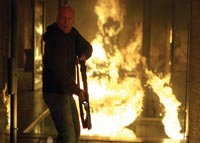 |
If Hostage were a good movie—and, despite an intriguing moral premise and some obvious skill on the part of its makers, it isn’t—it would be tempting to call it the quintessential Bruce Willis movie. Like The Sixth Sense, it begins with Willis playing a professional whose faith in his own skills is shattered when a person he was trying to help commits suicide. Like Die Hard, it features a hostage who eludes his captors and makes contact with cops on the outside while crawling around in air ducts. Like Mercury Rising and The Kid, one of the most important relationships in the film is between Willis and a young boy. And like, uh, The Whole Ten Yards, it co-stars Kevin Pollak as someone with ties to the mob.

Okay, so not every related film that comes to mind is a winner, but Hostage does have its strengths. For those of us who think Willis is at his best when he plays more vulnerable characters—and for those of us who have been disappointed these last few years as Willis smugly smirked his way through a string of lame comedies, with occasional detours into serious-minded, stone-faced fits of bravado such as Tears of the Sun—it is refreshing to see him play a human being once again, even in something as pulpy as this.
This time, Willis plays a police officer named Jeff Talley, and our first glimpse of him, when he is a hostage negotiator with the LAPD, does, admittedly, come across like it was scrawled on a napkin in screenwriter shorthand. Talley, perched on the roof of a building along with several other cops, is on the phone to an armed man who has taken his own wife and son hostage, and as if to prove to his fellow officers how calm he can be under pressure, Talley lies back and leisurely combs his beard while bargaining for the hostages’ lives. Alas, Talley miscalculates, and the entire family ends up dead (and, gratuitously, the man who perpetrates this murder-suicide is revealed to be religious). End prologue.

One year later, Talley has shaved his head and taken a job as the sheriff of a sleepy little suburb, where he assumes—wrongly, of course—that he will not have to face such trials again. For now, the greatest tension in his life seems to be between himself, his wife (Serena Scott Thomas), who may or may not be moving out, and his daughter (Willis’s real-life daughter Rumer), who resents the fact that they left the big city. But then three teenaged criminals break into a mansion, take the family prisoner, and shoot the police officer who comes to investigate the suspicious truck parked outside.
While Talley is personally involved in the early stages of this confrontation, he is more than happy to let more experienced officers from outside his jurisdiction take over. But then something unexpected happens. It turns out Mr. Smith (Kevin Pollak), the widowed owner of the mansion, has a secretly coded DVD that certain criminals want, and these criminals don’t see why a pesky little thing like a hostage crisis ought to get in the way of their retrieval of that information. So, quite out of the blue—this is one of those films where the bad guy knows exactly where to find the hero, and waits with a gun for who knows how long in the back of the hero’s car—they take Talley’s wife and daughter hostage and give him an ultimatum: either he gets the DVD for them, or they kill his family.

Hence the film’s intriguing moral dilemma: Will Talley, who resumes command against the advice of his colleagues, put retrieving the DVD ahead of saving the hostages? Will he possibly sacrifice another family in order to save his own?
This scenario has a lot of potential, but the film fails to exploit it, for several reasons. First, the only member of the Smith family whose life is directly jeopardized by Talley’s actions is the father, who seems like a loving dad and all but whose innocence in this whole situation is, to say the least, debatable. Second, Mr. Smith’s young son Tommy (Jimmy Bennett, who previously played the kid in the Flash costume in Daddy Day Care) is such an intelligent little tyke—he crawls around in the house’s secret passageways, while talking to Talley on a cell phone—that he seems more like someone who is helping Talley to get out of this sticky situation, rather than someone who might be trapped within it.

But most crucially, the film is sidetracked by its grim fascination with evil, especially as it is personified in Mars (Ben Foster), the most violent of the three young punks. Anyone who has seen Panic Room will figure out pretty early that Mars is to this film what Dwight Yoakam’s character was to that one; he is the most cold-blooded and psychotic of the three home invaders, and his partners in crime are fools if they think he feels any special loyalty to them. A fair bit of the film is spent on the sexual overtures that Mars makes to Mr. Smith’s teenaged daughter Jennifer (Michelle Horn), who just happened to be arguing with her dad over her somewhat skimpy attire when the boys broke in. And as if that weren’t creepy enough, the film kicks into hyperviolent overdrive when Mars writes messages for Jennifer in his own blood, while preparing to flood the house with Molotov cocktails.
By the time Mars stalks down a flame-drenched hallway, ready to throw a few more bombs around, you may wonder if you are still watching the same film that you were an hour ago. Hostage, adapted by Doug Richardson (Welcome to Mooseport) from a novel by TV veteran Robert Crais, is the first English-language film to be directed by Florent Emilio Siri, and like a number of recent American films directed by Frenchmen—Catwoman comes to mind—it revels in a sort of operatic vulgarity. This, in and of itself, is bad enough; but once the story exhausts its over-the-top cheesiness, there are still a few loose ends to tie up, and so the film drags on. For a thriller that started on such a tense, taut note, that’s a shame.
Talk About It
Discussion starters- What would you do in Talley’s place, as a police officer who had to choose between saving your own family and saving another? Is your first duty to your family, or to the public you promised to protect and serve? Would it make a difference if you knew that the other family included at least one criminal? Why or why not?
- What do you make of Mars’s fascination with death? Do films like this merely depict such fascination, or do they also encourage it? Point to specific shots and the way they frame certain acts of violence, or the way they use techniques such as slow-motion, etc.
- Why do you think both Talley and one of the criminals make the remarks they do about “rich people”? Is this a sign that Talley has something in common with the three young men who break into the house? What other signs might there be, if any? Does this help us to identify with the criminals, or with Talley? Do you think economic status matters in a case like this?
The Family Corner
For parents to considerHostage is rated R for strong graphic violence, language and some drug use. The violence includes shooting, people being hit with Molotov cocktails, and one particularly gruesome stabbing. Mars also gives Jennifer some seriously unwanted sexual attention (blowing smoke into her cleavage, etc.). In addition, a man who kills his family and then himself is overheard praying shortly before he commits his crime.
Photos © Copyright Miramax
What Other Critics Are Saying
compiled by Jeffrey Overstreetfrom Film Forum, 03/17/05When Bruce Willis appeared on the big screen recently with a pistol in his hand, you may have thought you were seeing a preview for Die Hard 4. Willis has been talking about the possibility of a fourth Die Hard film, but it’s not happening quite yet. In the meantime, Willis fans will have to settle for Hostage. This action-packed thriller, directed by Florent Siri, features Willis in the role of Jeff Talley, a former LAPD hostage negotiator who comes back from a slump by attempting to rescue a family from some convenience store robbers who have taken them captive.
“Hostage does have its strengths,” says Peter T. Chattaway (Christianity Today Movies). “For those of us who think Willis is at his best when he plays more vulnerable characters … it is refreshing to see him play a human being once again, even in something as pulpy as this. [But it] revels in a sort of operatic vulgarity. This, in and of itself, is bad enough; but once the story exhausts its over-the-top cheesiness, there are still a few loose ends to tie up, and so the film drags on. For a thriller that started on such a tense, taut note, that’s a shame.”
Harry Forbes (Catholic News Service) says, “Siri keeps up the unrelenting tension, which helps obscure some plot improbabilities (of which there are several). Willis gives a convincingly anguished performance, and Ben Foster … is scarily effective as the worst of the teens, with a scarily sadistic edge.”
“Willis shines in these kinds of films and Hostage is no exception,” says Michael Elliott (Movie Parables). “Siri cut his directorial teeth on video games and it shows in this film. Lots of attention has been paid to setting up the situations that the characters are in but the resolution of those situations are too easily achieved and not altogether believable.”
Marcus Yoars (Plugged In) says, “After sitting through two hours of this bloodbath, it strikes me as pointless to debate whether Hostage is a clever thriller or a shoot-’em-up action flick. What it is … is nauseating.”
The film didn’t settle too well with mainstream critics either, even the action fans.
Copyright © 2005 Christianity Today. Click for reprint information.












